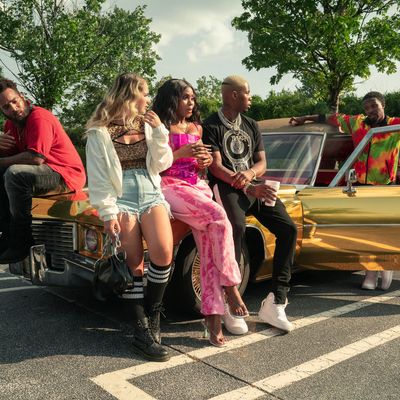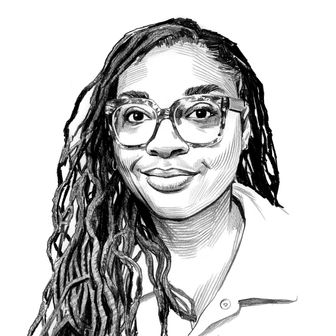
Frankly, the Pynk is a mess. The episode starts with one of the dancers, Toy, sneezing on a patron mid-lap dance. I yelped when it happened, and I probably would’ve cried germaphobe tears if it happened to me. And like Toy’s spittle, Roulette’s reputation for providing more intimate services is also spreading throughout the Pynk. She gets into an altercation with another dancer, Brazil, who insinuates that she’s been hearing the tea about a certain someone’s fellatio offerings. Roulette wins the fight, leaves Brazil leaking tears and blood, and denies that the rumor is about her as she’s getting dragged away by Big L Obviously, the entire moment is being broadcast via Instagram Live: At this point, Uncle Clifford bestows the ladies with the collective title of “The Real Househoes of Chucalissa.”
Sadly, the sneezed-upon Pynk patron works for the county health department. And if you don’t remember, she’s also the woman who passed out drunk at the club last season, ended up in jail with Mercedes…and cheated on her husband with his mother. Welcome back, sis. Her frequent stops at the Pynk don’t keep her from shutting it down due to COVID guidelines, most of which are hard to implement in a strip club, giving them 24 hours to comply or else they’ll be closed permanently. Like Hailey and Uncle Clifford said, “Lap dances from six feet away: Where they do that?”
(When news gets out that the club is temporarily closed, the show gives us a Pynk-ified recreation of “Well damn, if you can’t go the Bella Noche’s, where the hell can you go?” This season has been filled with similar references, one-liners, and clap backs, which is very representative of the memeification of television.)
With Lil Murda and Keyshawn still on their Dirty Dozen tour of the South, race looms inevitable. Keyshawn picks up Gidget on their way to Birmingham and her white identity magnifies the elephant in the room. On the way to their next club stop, news breaks that there has been yet another shooting of a Black person by the police. Teak is consumed by the coverage, while the others’ responses range from aloof to avoidant to anxious. Gidget’s lack of self-awareness, a trait that’s been conditioned in white people to uphold white supremacy, is jarring, draws a line in the sand that will always exist in her friendship with Keyshawn, who ultimately spends over $300 on an Uber to send her back home after things go sideways at their hotel later.
After the murder hits the news, people across the city begin to riot, and Birmingham institutes a curfew. I like how the reactions of Murda, Teak, Woody, Keyshawn, and Rome all differed from one another — a diversity of thought within the Black experience. Keyshawn is understanding but not vocal; Murda comes off indifferent, surrendered to how commonplace police killings have become; Rome seeks refuge in respectability, casting Black people as the problem. It hits Teak the hardest, and he eventually breaks down to Murda later in the episode, questioning whether he’s strong enough to live in a world where Blackness is synonymous with pain. Once they arrive at their hotel suite, Keyshawn, Gidget, Rome, and Woody start to turn up while Murda works on a feature for DJ Neva Scared. Teak is still glued to the news, and when Rome turns off the television to spout his anti-Black rhetoric, with Gidget yelling about for him to stop in the background, Teak snaps and smashes a table during a violent outburst.
Though I’m not the biggest fan of COVID storylines — I prefer to use television as escapism — I understand why some go that route, especially on a show that serves as a commentary on current real-life issues. Likewise, I’ve been a bit avoidant of television shows and movies centered around Black trauma, especially police brutality. (We find out this episode that Roulette’s brother, Demethrius, was also murdered by the police.) My father was a professor of Pan-African studies, I studied race in graduate school, and I live in my own Blackness daily, so my entertainment preferences lie elsewhere. I am happy to see that the writers are more focused on the intricacies of Black life in the South as well as experimenting with a shift in tone i.e. highlighting spirituality. Check out this great thread from the show’s brilliant creator on this season’s spiritual element: That spirit is definitely still in the Paradise Room!
Even if the first season had its fair share of trauma due to the systemic mistreatment of Black people, I was able to enjoy the show because that wasn’t the selling point. Now that the storylines beyond the club are being incorporated, I’m interested to see where they go, and the choice to pivot makes itself most known through the characters’ interpersonal relationships, specifically the queer ones. The moment I felt has was being alluded to has finally come: Teak and Murda have sex as a culmination of Murda consoling Teak following the blowout in Rome’s hotel room. I knew it! Outside of me loving that I was right, I appreciated their sex scene because it depicted safe, realistic sex between two men. Yes condom! Yes lube! Showing this kind of stuff in a normal, non-fetishizing light is what P-Valley does best. We see this again with Mercedes’s sex scene with Farrah. Farrah tricks Mercedes into visiting the condo without Coach present and admits to being attracted to her, with the two proceeding to have sex. Two queer sex scenes in one episode? Amazing.
While Mercedes is busy in an entanglement with a married couple, her mother, my mortal enemy, announces that she’s going to add her name to the ballot for mayor of Chucalissa. Whatever. She’s seen later exuding narcissism and a savior complex while encouraging people to riot. I’m all for a revolution but we all know Patrice is doing this to stroke her ego, not for the greater good. Andre, another ego-driven character, gets a taste of his own medicine upon his return home. His wife has apparently been getting hers and he walks in on her pleasuring a male friend. In true hypocritical fashion, he flips out like he wasn’t having phone sex and private dances with Hailey. Andre chokes the man out and then flees back to Chucalissa with his eyes firmly set on the mayor’s office, turning his father’s old home, since bequeathed to him, into his campaign headquarters.
The future of the club and the question of who will succeed Tydell Sr. is up in the air. Corbin is hellbent on procuring the land, so he ups his offer to $1 million. Hailey, understanding the value of the Pynk, continues to hold out. When Andre returns to Chucalissa after catching his wife cheating, he visits Hailey at the club, and she confesses that she’s been planning to sell the land the whole time, not knowing Uncle Clifford and Mercedes are listening in. They confront her and call out her foul behavior, but this doesn’t change her status as owner: She and Clifford still need to re-re-re-open the Pynk after failing to turn things around in 24 hours. See y’all in a week for the next episode of The Real Housewives of Chucalissa.
Chucalissa Chatter
• Rome’s cokehead energy is very off. Apart from his unfortunate views on social justice, his interaction with Keyshawn at the end was a little cringe. Plus, lightening Keyshawn’s skin in the poster is not it.
• I’m getting very ominous vibes from the winking game they’re playing on tour. The joking about being murdered juxtaposed with the shooting makes me anxious.
• I’ve made it very obvious that I’m Team Uncle Clifford all the way, but it was sad when Teak found out about the postcards. It’s implied that they had a relationship while in jail together, but Murda never sent letters like he did for Clifford.
• Showing the names of the people lost due to police brutality at the end of the episode was such a powerful statement. May we never forget their names and may we work toward change.


